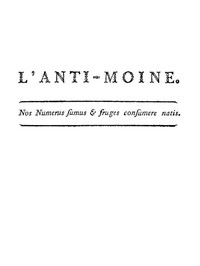L'anti-moine: nos numerus sumus & fruges consumere natis by Anonymous
"L'anti-moine: nos numerus sumus & fruges consumere natis" by Anonymous is a satirical poem written during the late 17th century. The work critiques the monastic system and the perceived hypocrisy of monks, arguing that their existence is detrimental to society and religion. This poem uses humor and sharp wit to address issues of morality and the misallocation of resources within monastic communities. The content of "L'anti-moine" consists of a series of verses
that vocally denounce the lifestyle and practices of monks, portraying them as idle and self-indulgent individuals who exploit their religious status for personal gain. The narrator accuses monks of being out of touch with the original virtues of spirituality and simplicity that the founders of monasticism intended. Through various arguments and anecdotal evidence, the text suggests that abolishing monkhood would not only benefit the state economically but would also promote greater moral integrity among citizens. The poem blends humor with a serious critique of religion, emphasizing the need for a return to genuine faith and practical contributions to society. (This is an automatically generated summary.)
Read or download for free
| How to read | Url | Size | |||
|---|---|---|---|---|---|
| Read now! | https://www.gutenberg.org/ebooks/61571.html.images | 62 kB | |||
| EPUB3 (E-readers incl. Send-to-Kindle) | https://www.gutenberg.org/ebooks/61571.epub3.images | 150 kB | |||
| EPUB (older E-readers) | https://www.gutenberg.org/ebooks/61571.epub.images | 149 kB | |||
| EPUB (no images, older E-readers) | https://www.gutenberg.org/ebooks/61571.epub.noimages | 48 kB | |||
| Kindle | https://www.gutenberg.org/ebooks/61571.kf8.images | 177 kB | |||
| older Kindles | https://www.gutenberg.org/ebooks/61571.kindle.images | 169 kB | |||
| Plain Text UTF-8 | https://www.gutenberg.org/ebooks/61571.txt.utf-8 | 47 kB | |||
| Download HTML (zip) | https://www.gutenberg.org/cache/epub/61571/pg61571-h.zip | 141 kB | |||
| There may be more files related to this item. | |||||
Similar Books
About this eBook
| Author | Anonymous |
|---|---|
| Title | L'anti-moine: nos numerus sumus & fruges consumere natis |
| Note | Reading ease score: 71.8 (7th grade). Fairly easy to read. |
| Credits |
Produced by René Galluvot (This file was produced from images generously made available by the Bibliothèque nationale de France (BnF/Gallica) at http://gallica.bnf.fr) |
| Language | French |
| LoC Class | DC: History: General and Eastern Hemisphere: France, Andorra, Monaco |
| LoC Class | PQ: Language and Literatures: Romance literatures: French, Italian, Spanish, Portuguese |
| Subject | France -- History -- Revolution, 1789-1799 -- Sources |
| Subject | France -- History -- Revolution, 1789-1799 -- Religious aspects |
| Subject | Satire, French |
| Subject | Monks -- France -- History -- 18th century -- Sources |
| Category | Text |
| EBook-No. | 61571 |
| Release Date | Mar 7, 2020 |
| Copyright Status | Public domain in the USA. |
| Downloads | 99 downloads in the last 30 days. |
| Project Gutenberg eBooks are always free! | |


